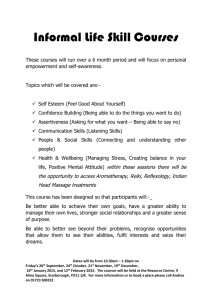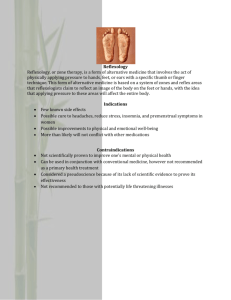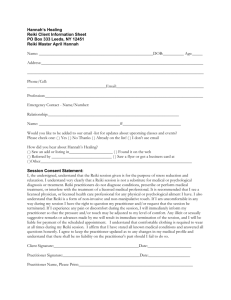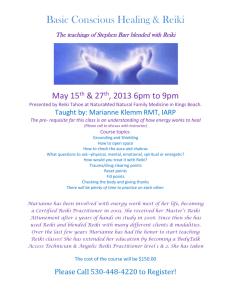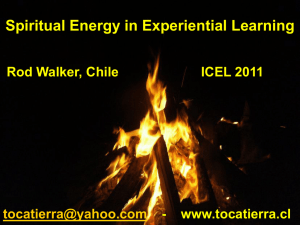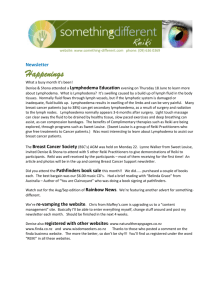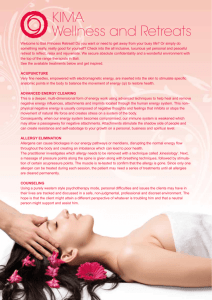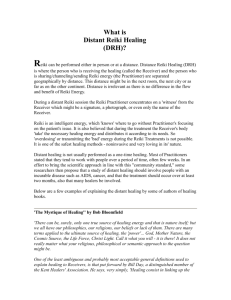Memorandum - National Health Freedom Coalition
advertisement
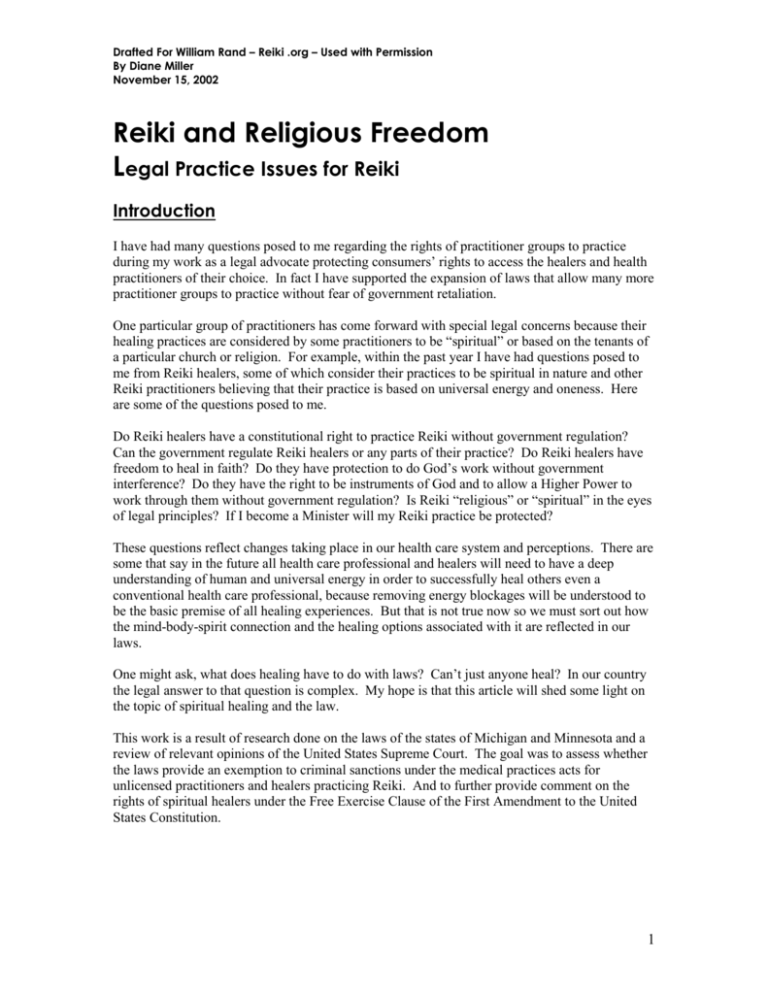
Drafted For William Rand – Reiki .org – Used with Permission By Diane Miller November 15, 2002 Reiki and Religious Freedom Legal Practice Issues for Reiki Introduction I have had many questions posed to me regarding the rights of practitioner groups to practice during my work as a legal advocate protecting consumers’ rights to access the healers and health practitioners of their choice. In fact I have supported the expansion of laws that allow many more practitioner groups to practice without fear of government retaliation. One particular group of practitioners has come forward with special legal concerns because their healing practices are considered by some practitioners to be “spiritual” or based on the tenants of a particular church or religion. For example, within the past year I have had questions posed to me from Reiki healers, some of which consider their practices to be spiritual in nature and other Reiki practitioners believing that their practice is based on universal energy and oneness. Here are some of the questions posed to me. Do Reiki healers have a constitutional right to practice Reiki without government regulation? Can the government regulate Reiki healers or any parts of their practice? Do Reiki healers have freedom to heal in faith? Do they have protection to do God’s work without government interference? Do they have the right to be instruments of God and to allow a Higher Power to work through them without government regulation? Is Reiki “religious” or “spiritual” in the eyes of legal principles? If I become a Minister will my Reiki practice be protected? These questions reflect changes taking place in our health care system and perceptions. There are some that say in the future all health care professional and healers will need to have a deep understanding of human and universal energy in order to successfully heal others even a conventional health care professional, because removing energy blockages will be understood to be the basic premise of all healing experiences. But that is not true now so we must sort out how the mind-body-spirit connection and the healing options associated with it are reflected in our laws. One might ask, what does healing have to do with laws? Can’t just anyone heal? In our country the legal answer to that question is complex. My hope is that this article will shed some light on the topic of spiritual healing and the law. This work is a result of research done on the laws of the states of Michigan and Minnesota and a review of relevant opinions of the United States Supreme Court. The goal was to assess whether the laws provide an exemption to criminal sanctions under the medical practices acts for unlicensed practitioners and healers practicing Reiki. And to further provide comment on the rights of spiritual healers under the Free Exercise Clause of the First Amendment to the United States Constitution. 1 Drafted For William Rand – Reiki .org – Used with Permission By Diane Miller November 15, 2002 History of Health Freedom and Access to Practitioners Historically our country has strong ideals of personal freedom.. Persons have the right to seek out or refuse medical treatments in accordance with our freedoms of bodily integrity and autonomy. In addition persons have the right to practice their trades and professions without government interference and to enjoy the pursuit of happiness as they see fit. However sometimes personal freedom are affected because the government has the power to protect citizens from harm. Early in American history it was clarified by case law that states, and not the federal government, have the right and authority to utilize their police power to protect the health and welfare of their own citizens. As part of this responsibility and included in this police power states have the right to regulate professions of people within their state to protect the safety of their citizens. Of course the police power cannot be used indiscriminately because Americans have fundamental constitutional rights, which the states are not free to regulate out of existence. However the state police powers have often been used to regulate health care professions in a number of ways on behalf of the safety of the people. Before a state regulates a profession it must evaluate in fact whether there is a need for police power or whether the profession poses no risk of harm to the public and therefore not subject to government intervention. In Minnesota there are criteria encoded in law for the legislature to review before imposing regulation on a profession, one of which is: “Whether the unregulated practice of an occupation may harm or endanger the health, safety and welfare of citizens of the state and whether the potential for harm is recognizable and not remote.” MN Stat. 214.001 Subd. 2. (a). A problem began almost one hundred years ago that affected consumers who wanted access to healers. The problem also affected health care practitioners that were not doctors. At that time, many states decided to regulate Physicians and Surgeons. Regulation took the form of licensing laws, which mandated that anyone practicing medicine must have a medical license. States defined the “practice of medicine” and there were criminal sanctions put in place for the practice of medicine without a license. The real problem with this plan was that they defined the practice of medicine very broadly to include all of healing. And thus the rest of the healing world was arguably considered criminal. These laws were amended and strengthened through the years and the following are portions of the current definitions of the practice of medicine in Minnesota and Michigan: Minn. Stat. 147.081(3)(3) Anyone who “offers or undertakes to prevent or to diagnose, correct, or treat in any manner or by any means, methods, devices, or instrumentalities, any disease, illness, pain, wound, fracture, infirmity, deformity or defect of any person.;” MCL 333.17001(1)(d): ““Practice of medicine” means the diagnosis, treatment, prevention, cure, or relieving of a human disease, ailment, defect, complaint, or other physical or mental condition, by attendance, advice, device, diagnostic tests, or other means, or offering, undertaking, attempting to do, or holding oneself out as able to do, any of these acts.” 2 Drafted For William Rand – Reiki .org – Used with Permission By Diane Miller November 15, 2002 In Minnesota the criminal charge for practicing medicine without a license is a gross misdemeanor. In Michigan the criminal charge is a felony. Since the passage of these broad definition laws a number of groups have approached the legislature requesting licensure laws of their own, thus carving out a specific area of practice for themselves and making the practice of that profession by others without a license a criminal charge. For example nurses, osteopaths, chiropractors, and many others are now licensed in most states. In Minnesota there are 39 professions licensed by the state and a number of registered and certified health care professions. In addition and also following the passage of the medical practice act a number of unlicensed health care practitioner groups requested a simple exemption from the criminal charges based on either the fact that they posed no risk of harm to the public or that they had a constitutional right to practice their trade. In some instances these simple exemptions passed into law. For example in many states there is an exemption for persons who heal under the Christian Scientist religion, or person healing by means of prayer. The language is different in every state and the exemptions reflect the public policies of that particular state’s culture. The following are the current exemptions from the practice of medicine for practitioners regarding religion and healing in Minnesota and Michigan: “A Christian Scientist or other person who endeavors to prevent or cure disease or suffering exclusively by mental or spiritual means or by prayer.” MN. Stat. 147.09 (11) “An individual who provides nonmedical nursing or similar services in the care of the ill or suffering or an individual who in good faith ministers to the ill or suffering by spiritual means alone, through prayer, in the exercise of a religious freedom, and who does not hold himself or herself out to be a health professional.” MCL 333.16171 Sec. 16171 (d) Against this backdrop, this article will discuss the rights of individuals to do spiritual healing based on constitutional rights and religious freedoms in states where there is no statutory exemption from the medical practice act. It will also discuss legal issues in the case where there already exists a statutory exemption allowing spiritual healing. And finally it will discuss the impact of new laws being recommended allowing other unlicensed health care providers to practice, and how those new laws might affect the rights of spiritual healers to practice. In General – Religious Freedom The Free Exercise Clause of the First Amendment to the United States Constitution applicable to the states via the fourteenth amendment1 mandates that “Congress shall make no law respecting an establishment of religion, or prohibiting the free exercise thereof.”2 The United States Supreme Court has a long standing history of case law discerning and interpreting the constitution of the United States as it applies to the Free Exercise Clause of the First Amendment and the opinions and the literature on this topic are of great quantity and complexity. I do not intend to summarize the entire topic area. However what I offer here are 1 2 Cantwell v. Connecticut 310 U.S. 296 (1040). U. S. Constitutional Amendment I. 3 Drafted For William Rand – Reiki .org – Used with Permission By Diane Miller November 15, 2002 key guiding principles and examples of what legal issues might surface as we go forward to protect consumer access to persons that heal by spiritual means. The Free Exercise Clause embraces both freedom to believe and freedom to act. 3 However religious beliefs and religious acts are considered separately. For instance, the freedom to hold religious beliefs and opinion is absolute.4 However although persons are free to believe what they will – and to teach and preach what they believe, “when beliefs lead to conduct, the conduct is subject to regulation.”5 (i.e.…”Although one is free to believe what one will, religious freedom ends when one’s conduct offends the law by, for example, endangering a child’s life.6) Limitations on Religious Conduct Although Americans have an absolute right to believe what they want, the government has the power to regulate certain spiritual conduct. This conclusion was developed in case law over time and courts refer to the core concept in Reynolds v. U.S 7 stating: “Laws are made for the government of actions, and while they cannot interfere with mere religious belief and opinion, they may with practices. …Can a man excuse his practices to the contrary because of his religious belief? To permit this would be to make the professed doctrines of religious beliefs superior to the law of the land, and in effect permit every citizen to become a law unto himself.” And in Smith v. Emp. Div8 the court stated that: “…Free Exercise jurisprudence consistently reiterated that the right to free exercise of religion does not relieve an individual from complying with a law of general applicability, not directed at any religion, that proscribes or prescribes conduct that a religion may prescribe or proscribe. Protection of Religious Conduct “But even conduct – when religiously driven—enjoys some constitutional protection…” 9 The Balancing Test When considering protection of religious conduct and avoiding government intrusion courts have historically applied a balancing test to balance the state’s compelling interest against the actor’s free exercise interest in religious based conduct. This balancing test has been called the strict scrutiny test and is “manifested in the ‘compelling interest test’, which is composed of five elements: 3 Lundman v. McKown 530 N.W.2d 807 at 817 (Minn.Appp. 1995). Braunfeld v. Brown 366 U.S. 599, 603 (1961). 5 Lundman v. McKown 530 NW 2d 807 (1995). 6 Id. At 817. 7 Reynolds v. U.S., 98 U.S. 145(1878) 8 Smith v. Emp. Div., 307 Or. 68, 763 P.2d 146(1988). 9 Lundman v. McKown 530 NW 2d 807 (1995). 4 4 Drafted For William Rand – Reiki .org – Used with Permission By Diane Miller November 15, 2002 (1) Whether a defendant’s belief, or conduct motivated by belief, is sincerely held; (2) Whether a defendant’s belief, or conduct motivated by belief, is religious in nature; (3) Whether a state regulation imposes a burden on the exercise of such belief or conduct; (4) Whether a compelling state interest justifies the burden imposed upon a defendant’s belief or conduct; (5) Whether there is a less obtrusive form of regulation available to the state.”10 However this balancing test is part of intense legal discourse. For example in 1991 Hamline Journal of Public Law and Policy published an article entitled “Free Exercise Clause Redefined: the Eradication of Religious Liberties in Employment Div., Dept. of Human res. Of Oregon v. Smith. I cite it here to give an example of the continued legal discourse regarding the Free Exercise Clause opinions. It reads: “Until recently, the United States Supreme Court consistently used a “balancing test” to determine whether the Free Exercise Clause protected an individual’s religiously motivated act against a law of general applicability mandating that the individual act otherwise. The Court balanced the substantial infringement a state had on a religious act against the Government’s interest in regulating that act. If the governmental interest was compelling, and if the regulation was the least intrusive means available to regulate the behavior, then the state interest outweighed the individual’s religious interest, so that the Free Exercise Clause was not violated. Recently, the applicability of the balancing test to a Free Exercise claim, and the ability to bring a Free Exercise claim at all, was drastically limited in Employment Div., Dept. of Human Res. Of Oregon v. Smith (Smith II). In Smith II, the majority held that Sherbert’s balancing test was inapplicable to Free Exercise claims against criminal statutes of general applicability. The majority felt that to relieve an individual from complying with a criminal law of general applicability because of religious beliefs would result in a constitutional anomaly. However, in the past the balancing test had consistently been used in evaluating Free Exercise claims against generally applicable criminal laws. Thus, in reaching its holding, the majority rewrote longstanding Fee Exercise jurisprudence.11 The case of Smith was very controversial because the U.S. Supreme Court ruled that laws of general applicability which incidentally burden the free exercise of religion need not pass a strict scrutiny balancing test.12 In 1994, in response to Smith, the US Congress enacted the Religious Freedom Restoration Act (RFRA) to overturn Smith. RFRA reinstated the need for strict scrutiny test for all state and federal laws of general applicability that incidentally burden one’s ability to practice religion. However, three years later in 1997, in City of Boerne v. P.F. Flores, the US Supreme Court overturned the RFRA and declared it unconstitutional on grounds of separation of powers and federalism claiming Congress had exceeded the scope of its Congressional power and judicial authority to interpret law is well established. 13 10 People of the State of Michigan v. Mark Dejonge and Chris Dejonge 501 N.W.2d 127 1993. Hamline Journal of Public Law and Policy, Volume 12, Number 1, Spring 191, Dollen. 12 Kansas v. McBride No. 78,190 (Kan. App. 2/27/98) 13 Id. 11 5 Drafted For William Rand – Reiki .org – Used with Permission By Diane Miller November 15, 2002 Thus, following Smith and Flores, currently a state may pass a law of general applicability that incidentally burdens the practice of religion without violating the First Amendment. 14 Although there are exceptions to that in certain legal circumstances one of which is where there are two fundamental rights involved such as in DeJonge where religious freedom and parental rights were both at issue. In the event that the balancing test is applied the following discussion utilizing specific case law may be helpful. Elements One and Two: Regarding the first element, a person’s religious beliefs must be found by a court to be sincerely held based on the facts of a case. For example in DeJonge, the Court had no trouble confirming that the DeJonge family was sincere in their beliefs.15 However regarding the second element requiring a belief, or conduct to be motivated by belief that is religious in nature the Court reasons in Dejonge: “To be afforded the protection of the Free Exercise Clause, an individuals behavior must be religiously motivated, as the Court in Yoder, supra at 215-216, explained: A way of life, however virtuous and admirable, may not be interposed as a barrier to reasonable state regulation of education if it is based on purely secular considerations; to have the protection of the Religion Clauses, the claims must be rooted in religious belief…Thus, if the Amish asserted their claims because of their subjective evaluation and rejection of the contemporary secular values accepted by the majority, much a s Thoreau rejected the social values of his time and isolate himself at Walden Pond, their claims would not rest on a religious basis. Thoreau’s choice was philosophical and personal rather than religious, and such belief does not rise to the demands of the religion Clauses. Thus this Court must accept a worshiper’s good faith characterization that its activity is grounded in religious belief because ‘it is not within the judicial ken to question the centrality of particular beliefs or practices to a faith, or the validity of particular litigants’ interpretations of those creeds’. Hernandez v. Comm’r of Internal Revenue, 490 U.S. 680,699; 109 S Ct 2136; 104 L Ed 2d 766 (1989). This must be so because “men may believe what they cannot prove. They may not be put to the proof of their religious doctrines or beliefs. Religious experiences which are as real as life to some may be incomprehensible to others.” Ballard, supra at 86. Nor is religious orthodoxy necessary to obtain the protection of the Free Exercise Clause. Religious belief and conduct need not be endorsed or mandated by a religious organization to be protected. Emmanuel Baptist Preschool, supra at 392 (Cavanagh, J., concurring). Indeed, because popular religious beliefs are rarely threatened by elected legislators, the free Exercise Clause’s major benefactors are religious minorities or dissidents whose beliefs and worship are suppressed or shunned 14 15 Id. DeJonges. 6 Drafted For William Rand – Reiki .org – Used with Permission By Diane Miller November 15, 2002 by the majority. To hold otherwise would be to deny the ‘Religion…must be left to the conviction and conscience of every man…’”16 Recently, in a Minnesota case, State v. Tenerelli17, a defendant challenged a mandate to pay restitution to his victim for a Hu Plig healing ceremony, based on the Establishment Clause of the Constitution of the United States. The lower District Court characterized Hu Plig as “ a social and cultural tradition that has been practiced in the Hmong culture for thousands of years…It is not a religious practice or belief, nor is it a ‘face-saving’ endeavor; rather it is a healing ceremony intended to restore the soul of a victim of physical or emotional trauma.”18 On Appeal the appellant contended that restitution awarded for spiritual purposes violates the Establishment Clause of the Constitution of the United States and the Court responded: “Since the evidence supports the trial court’s conclusion that the Hu Plig ceremony is not religious, we need not address the issue further.”19 But in comparison, in another recent case in Minnesota, a lawsuit against a clergyperson counselor for negligence was challenged because it fostered excessive governmental entanglement with religion thus violating the Establishment Clause. The Courts found that a resolution of the negligence claim for negligent counseling would violate the First Amendment because in this particular case the District Court had made an assessment of whether the counselor followed the ethical counseling guidelines of the minister’s handbook, and the Appeals court found that such an assessment resulted in the excessive entanglement of the district court in ‘religious doctrine practice, or church polity”.20 Element Three: The third element of the test is whether the government has imposed a burden on the exercise of religious freedom. An expansion of this concept is given in Dejonge when it states that: “A burden may be shown if the “affected individuals be coerced by the Government’s action into violating their religious beliefs [or whether] governmental action penalize religious activity by denying any person an equal share of the rights, benefits, and privileges enjoyed by other citizens.”21 And “Put simply, the petitioner must prove that he has been “enforced, restrained, molested, or burdened…otherwise suffer, on account of his religious opinions or beliefs…..The burden on religious liberty, however, need not be overwhelming, because ‘when subtle pressure diminishes the right of each individual to choose voluntarily what to believe.”22 In Dejonge the Courts found that a regulation which required parents who conduct home schooling for their children to provide instructors certified by the state posed a heavy burden on the family’s exercise of their religion.23 In State, Michigan Dept. O Social Services v. Emmanuel Baptist Preschool where the state attempted to mandate all day cares be licensed, the Court reasoned that “Licensure, by its very 16 People v Dejonge 470 N.W.2d 433 (1991) State of Minnesota v. Tenerelli 583 N.W. 2d 1 (Minn. App. 1998) 18 Id. 19 State of Minnesota v. Tenerelli no. C3-98-318 (Minn 08/05/1999) 20 Odenthal v. Minnesota Conference of Seventh-Day Adventists, 632 N.W. 2d 783 (Minn. App. 2001). 21 People v. DeJong, 442 Mich. 266, 501 N.W.2d 127 (Mich. 05/25/19993) 22 People v. Dejong 23 Id. 17 7 Drafted For William Rand – Reiki .org – Used with Permission By Diane Miller November 15, 2002 nature, is a prior restraint and whenever a prior restraint impinges upon First Amendment rights, it carries a heavy presumption against constitutional validity.24 Accordingly the Court found that the act’s licensing provision requires submission to the authority of the state to decide whether this religious activity may be conducted and that the practice of their religion was burdened by the licensing requirement. However and importantly, the Court characterized the burden as minimal and indirect, and found that a substantial state interest existed in protecting the health and welfare of preschool children being cared for outside their homes.25 This case involved a church that asserted that the plain language of a rule burdened the exercise of their religious belief that the use of corporal punishment to discipline children is required by the Bible – spare the rod, spoil the child. The rule they were resisting read “Staff shall be prohibited from…(a), shaking, biting, pinching, or inflicting a form of corporal punishment.”26 The states commented that “Thus, although the prohibition against spanking with a Ping-Pong paddle burdens the church’s free exercise of its religious beliefs, the state’s interest in protecting its very young outweighs the burden. In so holding, we recognize that some practices rooted in religious principle may be dangerous to the health and welfare of certain members of society.27 Element Four: Of course the fourth element of strict scrutiny, the compelling interest test, has gained much notoriety over the years because of the variety of important interests the government reasons that it needs to regulate. In 1995, in Minnesota’s Lundman v McKown 28 it was undisputed that the religious belief of the Christian Scientist practitioner was sincerely held and that the religious belief would be burdened by the proposed regulation, and the balancing test required proof of a compelling state interest. After the compelling state interest test Minnesota’s interest in protecting the welfare of children was considered compelling.29 And in Tennessee’s In Re Hamilton the state was found to have a compelling interest in chemotherapy for a child over a parents’ religious objection.30 But in contrast, in Michigan, in Brown v. Laitner,31 a case where a young boy died after being cared for by a Christian Scientist, the Michigan Court of Appeals had considered whether the state’s parents patriae interest in children’s welfare is sufficiently compelling to permit a common-law action in ordinary negligence when religious conduct proximately causes the injury or death of an infant. The court of appeals held that a private negligence action is not part “of the states exercise of its power for the protection of children.”. The case was Appealed to the Supreme Court which granted appeal of a limited question of whether the religious exemption to the medical malpractice act applies to allegation that the practitioner engaged in diagnosis and 24 Id. Michigan v. Emmanuel Baptist Preschool, 434 Mich. 380, 455 N.W.2d 1, 1990 MI 628. 26 Id. 27 Id. 28 Lundman v. McKown 530 NW 2d 807 (1995) 29 Id. 30 In re Hamilton, 657 SW2d 425, 429 (Tenn Ct. App 1983), appeal denied (Tenn Sept 29, 1983). 31 Rev. Ralph Brown v. Jeanne Laitner 435 N.W.2d 1, 432 Mich. 861 1989. 25 8 Drafted For William Rand – Reiki .org – Used with Permission By Diane Miller November 15, 2002 whether those allegations support a cause of action inferred from violation of an act barring the unauthorized practice of medicine.32 However after consideration of the briefs and oral arguments of the parties the leave to appeal was vacated and denied because the Court was not persuaded that the question presented should be reviewed by the Supreme Court.33 There was a lengthy dissenting opinion which argued that the issues would affect many children and should be heard by the Supreme Court and that the cause should be remanded to the trial court and that “The inquiry would be whether defendants engaged in diagnosis, an activity reserved to licensed physicians, or whether they engaged in spiritual healing alone, an activity exempted from the licensing requirements”.34 The dissent pointed out that the lower Court of Appeals had attempted to balance the right of religious freedom and a young boy’s right to life-saving medical treatments, and had found that “the public policy of Michigan favors “the untrammeled exercise of good-faith spiritual healing practices.”35 It noted that in ascertaining such public policy, the Appeal Court had relied in part on its construction of the religious exemption set forth in the Medical Practice Act:…”36 The dissent of the Supreme Court argued that “Although the Court of Appeals declared that the act exempted Christian Science practitioners, the exemption may be narrower than the Court assumed. The Legislature has attempted to balance religious freedom and the interest in saving human lives under the Medical Practice Act.”37 In Michigan v. Emmanuel Baptist Preschool, the court held that the rule mandating licensure of daycares applied to Emmanuel Baptist, even though licensure would burden religious activity. In Dejonge, the court held that the state did not have a compelling interest to mandate the certification of all teachers including home schoolteachers. The Court held “In sum we conclude that the historical under-pinnings of the First Amendment of the United Sates constitution and the case laws in support of it compels the Conclusion that the imposition of the certification requirement upon the DeJonges violates the Free Exercise Clause…Thus, we reaffirm “that sphere of inviolable conscience and belief which is the mark of a free people.” 38 Element Five: Least Restrictive Means The last question in the strict scrutiny test is whether there is a less obtrusive form of regulation available to the state. It should be noted that the individuals burdened by governmental regulations do not have the burden of proof of coming up with alternative suggestions. As so well stated in DeJonge, “the Court of Appeals erroneously placed the burden of proof upon theDejonges. The Court of Appeals, by requiring that the individual burdened by governmental regulation prove that alternatives exist, while at the same time accepting at face value unsubstantiated assertions by the state, has turned constitutional jurisprudence on its head. Our citizens need not ‘propose an alternative’ to be afforded their constitutional liberties.”39 In Minnesota, in Lundman, when Appellants argued that there were less-restrictive means to accomplishing the state’s goals, citing the Michigan Laitner case the Court replied “but appellants 32 Brown v. Laitner. Id. 34 Id. 35 Id at 48. 36 Id. 37 Id. 38 DeJonge at 84. 39 Id. At 82. 33 9 Drafted For William Rand – Reiki .org – Used with Permission By Diane Miller November 15, 2002 are bound by Minnesota law, not Michigan law; and the statutes in the two states differ. We do not believe that the Minnesota legislature sought to limit its rights as parens patriae by simply exempting spiritual healers from criminal child neglect statutes or by exempting Christian Scientists from laws that forbid practicing medicine without a licensed. Although we agree that Minnesota statutes include some accommodation to the Christian Science religion, the statutes should not be read as authorizing reliance on prayer as a sole treatment for seriously-ill children under all circumstances or (by implication) as proscribing civil lawsuits. The statutes simply indicate the legislature’s willingness to tolerate this religious practice—up to a point. We reject appellants’ argument that the Minnesota legislature has sanctioned prayer alone to treat a child battling a life-threatening disease.40 In Michigan’s Emmanuel Baptist Preschooler case the court held that there was no less restrictive alternative to satisfy the state’s compelling interest and the state could constitutionally require the defendants to comply with the licensure requirement in statute. The Case of Reiki The practice of Reiki, reviewed in light of these complex constitutional issues, poses a number of legal questions regarding laws and administrative regulations as they apply to the healing arts. Based on research of case law in Michigan and Minnesota no instances of legal proceeding against Reiki practitioners for practicing Reiki were found. There have been individual states agency or administrative proceedings affecting Reiki practice, such as massage licensing board meetings or nursing board meetings that attempt to discern whether Reiki can be freely practiced by those professionals. However, in MN and MI there have been no attempts to suggest Reiki is an exclusive healing behavior relegated to one particular profession over the other. Many professionals and individuals from all walks of life and all professions are practicing Reiki at this time. Variety of Legal Questions: Legal challenges come from many legal avenues. For example, there are criminal laws that affect health care practitioners; there are state, local, and federal administrative agencies and state professional board laws that affect health care professionals; and there are civil laws that allow individuals to sue health care practitioners for money damages. Here are some of the legal questions posed by the cases we have already reviewed: In Lundman the question was posed whether the award of punitive damages for actions based on the teaching of church doctrine was unconstitutional? And another question in Lundaman was whether a common-law negligence action for damages could be brought against a Christian Scientist practitioner or whether bringing such an action would violate religious freedoms. In Odenthal, a question was whether a negligence action could be brought against a counselor member of the clergy or whether it would be precluded based on the First Amendment prohibition against laws respecting an establishment of religion. 40 Lundman at 818. 10 Drafted For William Rand – Reiki .org – Used with Permission By Diane Miller November 15, 2002 In Tenerelli, the question was whether an existing statute mandating defendants pay restitution to victims where the defendant was asked to pay for a healing ceremony was unconstitutional violating the Establishment Clause of the U.S. and Minnesota Constitution. In Brown v. Laitner the original leave to Appeal to the Supreme Court of Michigan posed the following questions; 1) whether the religious exemption to Michigan’s Medical Practice Act applies to the allegation that a Christian Scientist engaged in diagnosis and 2) if the exemption does not apply then whether a civil negligence lawsuit can proceed based on allegations of diagnosis (practice of medicine without a license). In DeJonge the question was whether an existing statute was unconstitutional in violation of the Free Exercise Clause of the First Amendment when it required parents who conduct home schooling for their children to provide instructors certified by the state. In Emmanuel Baptist Preschool the question was whether the State of Michigan, Department of Social Services, may constitutionally require the Church and its preschool to obtain a license and comply with certain administrative rules in order to operate their day care. Reiki Legal Questions: Legal questions regarding Reiki may arise in the future as Reiki practitioners become more prominent in the culture. The following are some possible legal questions and a responding discussion of those posed: I. Whether the practice of Reiki constitutes the practice of medicine in a given state under the Medical Practice statutes and whether Reiki practitioners are exempt from this statute under the Free Exercise clause of the First Amendment. Discussion: The definition of the practice of medicine in Minnesota and in Michigan is very broad. For that reason, if a criminal case would go forward and the facts of the practitioner behaviors were set forth, a healing practitioners might be considered to be practicing medicine based on the very broad definition of practice of medicine. In Michigan a naturopath was recently prosecuted for practicing medicine without a license.41 However a similar naturopathic case went forward in South Dakota this year and the naturopath was not considered to be practicing medicine. And in Minnesota when a farmer provided colostrums to sick persons, he was charged with practicing medicine without a license.42 The results of the case were two hung juries and finally a dismissal of all charges. Even if the courts were to find Reiki to be the practice of medicine under these broad definitions, a Reiki practitioner might attempt to utilize the First Amendment religious freedom defense if they held Reiki as their religion. However since the RFRA has been found to be unconstitutional and the medical practice act might arguably be considered a “law of general applicability” a balancing test might not be allowed and the criminal law would be upheld as interpreted. Whether or not a balancing test t will be used in a particular case is complex and has to do with the type of case brought forward. If the strict scrutiny test was used the discussion might follow as such: 41 42 People v. Rebecca Rogers, 249 Mich. App. 77, 641 N.W.2d 595 (Mich. App. 12/28/2001) People v. Saunders, 542 NW2d 67 (Minn.App. 1996). 11 Drafted For William Rand – Reiki .org – Used with Permission By Diane Miller November 15, 2002 1) Was the Reiki practitioner’s beliefs firmly held? This question would be based on each individual case and facts suggesting a person’s sincerity would be reviewed. 2) Were the behaviors religious in nature? This would be an important question of fact in the individual case because some Reiki practitioners view Reiki healing as their spiritual belief system or creed or religion and other persons view Reiki as a universal healing modality, a worldview, or energy healing. Some persons have established churches or become ministers thinking that this will guarantee them that they can practice whatever they want. However, even if Reiki practitioner considered Reiki their religion, or even a person is involved in a church, in order to be convincing and meet a challenge prohibiting or regulating the practice of Reiki as a religion, a practitioner would need to stand up to all five elements of the scrutiny test as they apply to the Free Exercise Clause of the First Amendment. Other wise as we noted before: “Laws are made for the government of actions, and while they cannot interfere with mere religious belief and opinion, they may with practices. …Can a man excuse his practices to the contrary because of his religious belief? To permit this would be to make the professed doctrines of religious beliefs superior to the law of the land, and in effect permit every citizen to become a law unto himself.” 3) Was a Reiki practitioner burdened by the government regulation? A Reiki practitioner would most likely need to establish that they are being enforced, restrained, molested, or burdened or otherwise suffer on account of their religious beliefs. If the legal requirements of the state do not directly coerce a practitioner in to acting contrary to their religious beliefs then the legal requirements may be constitutional. In other words the question would be: Will a Reiki practitioner be considered to be acting contrary to their beliefs if they are required to be regulated? If a Reiki practitioner abided by the law of the land would it necessitate them acting contrary to their religious beliefs? 4) Even if 1, 2, and 3 are met, the question as to whether the practice of medicine statute reflects a compelling state interest warranting regulation of conduct will be asked. States would not be able to burden religious conduct if there was not a compelling state interest at issue. Historically regulation of health care practices has been considered a compelling state interest to protect the health, safety, and welfare of citizens. Most recently the practice of medicine statutes in MI and Minnesota have been held to be constitutional43. 5) And finally, is licensing the least restrictive means of accomplishing the states interest? In Michigan, Emmanuel Baptist, the court found that licensing was the least restrictive means of accomplishing the states objectives. However, in Minnesota, the court found that a law was unconstitutional because the state failed to demonstrate that both values of freedom of conscience and public safety could not be achieved through alternative means, the use of white reflective tape and a lighted red lantern.44 On a 43 44 People v. Rogers, and People v. Saunders. State v. Hershberger 462 N.W.2d 393, 1990 12 Drafted For William Rand – Reiki .org – Used with Permission By Diane Miller November 15, 2002 national level, the current health freedom movement may demonstrate that there are less restrictive means of regulation than licensing, in order to protect the rights of practitioners to practice the healing arts. The above analysis focused on the practice of medicine issues however a similar analysis might be applied if a state attempted to regulate Reiki under a licensing law other than the medical practice laws. There is no absolute guarantee that the free Exercise Clause of the First Amendment will allow all religious conduct to be practiced or that it will unilaterally prohibit a state from making a law regulating on some least restrictive level, religious conduct. For this reason religious groups that practice healing have approached the legislature and encouraged the passage of specific exemptions to the medical practice acts based on constitutional grounds of religious freedom. These exemptions have been placed directly within the Medical Practice Acts. II. Does an existing exemption to the medical practice act in any given state for spiritual or religious healing practices or healing by prayer apply to Reiki practitioners, thus automatically exempting them from the practice of medicine statutes. Discussion: The exemptions to the medical practice acts for Christian Scientists and other religious healers do not contain identical language from state to state. As we have seen in Minnesota and Michigan the exemptions are different and public policy and cultures differ from state to state in their approach to health care as it applies to religious freedom. Whether a claim has been brought against an individual practitioner for the practice of medicine, or whether a claim has been brought against the government for prohibiting religious freedom is the first question. Other claims could proceed as well. If a practitioner is being charged with the practice of medicine without a licensed the proceeding will depend on the facts of that individual case. First one would need to read the statutory exemptions for religious healing of the state in question and research and review the case law reflecting the interpretation of the exemption. In Minnesota, the terms spiritual and mental and prayer are used. What does the sate consider to be spiritual? In Michigan the word nonmedical nursing is used. What does the state consider to be nonmedical nursing? In addition, even if a practitioner falls under the jurisdiction of an exemption, we have seen in MN and MI, certain instances where religious conduct is burdened but the compelling state interest allows for the state to regulate religious conduct. What are the facts of the case, and what behaviors are protected under the exemption and what state interests would be considered compelling and supersede any religious freedom burden? (Note: Minnesota child protection was a compelling state interest.) Secondly, research and review of case law will reveal whether Free Exercise claims have been successful in other legal proceeding such as common-law negligence actions or administrative proceedings. Results of research will show where the line is drawn in terms of when and how a government has regulated religious conduct. And what public policy exists in the state. Finally, if it appears that Reiki practice may not be included under the exemption then what is needed to allow Reiki practitioners to practice their healing arts? 13 Drafted For William Rand – Reiki .org – Used with Permission By Diane Miller November 15, 2002 Iii. How do new statues exempting unlicensed practitioners from the practice of medicine impact Reiki practitioners? Many states have exemptions to the practice of medicine statutes for spiritual healing. In addition, there are at least five states that have laws protecting the rights of other unlicensed practitioners in general to practice the healing arts under certain circumstances. Each of these states addresses unlicensed health care practitioners in a different manner. Minnesota and Rhode Island have created agency offices to respond to complaints regarding unlicensed practitioners and have set up guidelines for disclosure to clients and prohibited conduct. California and Idaho have exempted certain behaviors of unlicensed practitioners from charges of practice of medicine without a license and complaints are addressed by the existing medical boards. Oklahoma has limited their Medical Practice statute to the practice of allopathic medicine thus impacting jurisdiction over unlicensed practices. In order to discern how a new regulation for unlicensed practitioners would impact Reiki, a Reiki practitioner needs to look at the existing and new laws of that state. For example, in Minnesota, both the practice of medicine statute and the unlicensed complementary and alternative health care statutes have special exemptions for healing by spiritual or mental means or by prayer. Thus a practitioner practicing by spiritual or mental means or by prayer alone would be able to argue that they do not fall under the jurisdiction of the Board of Medical Practice or the jurisdiction of the new Office of Unlicensed Complementary and Alternative Health Care Practices. However, if an unlicensed practice is not considered to be exempt on the basis of religious freedom then a person would be considered to be practicing medicine or be considered to be an unlicensed complementary and alternative health care practitioner under the new statute. If a practitioner that does not fall under the spiritual exemption and wishes to be exempt from the practice of medicine and they wish to be solely under the jurisdiction of the unlicensed practitioner statute, an unlicensed practitioner would have to abide by the requirements of the new UCAHP statute. In Minnesota, since there is no guarantee that Reiki will be considered to fall under the religious exemption statute, some Reiki practitioners prefer to practice under the UCAHP law in order to be exempt from practice of medicine. Others believe that their practice falls under the exemption and they thus do not abide by the mandates of the unlicensed law. Even if a practitioner is considered a spiritual healer in Minnesota, other laws in Minnesota may impact them For example there may be reporting requirements on behalf of children with serious life threatening illness etc. Michigan currently has an exemption to the medical practice act for spiritual healers however Michigan does not have an unlicensed practitioner law exempting certain unlicensed practitioners from charges of practice of medicine without a license. Therefore, if Reiki was challenged and found to not be religious, it would most likely be vulnerable to charges of practicing medicine without a license. However a court might then hold that it is not the practice of medicine and this would set a precedent for other similar healing practices so that they would not be considered practice of medicine in the future either. Whether Reiki would be considered the practice of medicine without a license on its own merit would depend on interpretation and findings by Michigan courts. Note, in Laitner the Supreme Court did not decide on the question of whether 14 Drafted For William Rand – Reiki .org – Used with Permission By Diane Miller November 15, 2002 the practices of a Christian Scientist were considered diagnosis or the practice of medicine. However Michigan courts did find that a naturopath was practicing medicine. In Summary The question of Reiki and religious freedom is complex. On a case by case basis any legal challenges to Reiki practice would most likely turn on whether there is a justifiable regulation of health care practitioner practices. In addition in some cases the five questions of the strict scrutiny test will be considered to discern whether a fundamental constitutional freedoms of a practitioner has been unduly burdened. In some instances the law of general applicability will be upheld even when there is an incidental burden on religious freedom. In other instances the strict scrutiny test will be discussed. Citizens have a right to believe what they want but their conduct is subject to regulation within limits even in the face of religious freedom. People can challenge the government when they believe the government is encroaching upon their constitutional rights. That is the beauty of America. It is our hope that we can create laws that protect our fundamental liberties and not regulate individuals unnecessarily. And in the event that government has a compelling reason to regulate then hold the government accountable to regulate in the least restrictive means in order to accomplish the objective. 15
